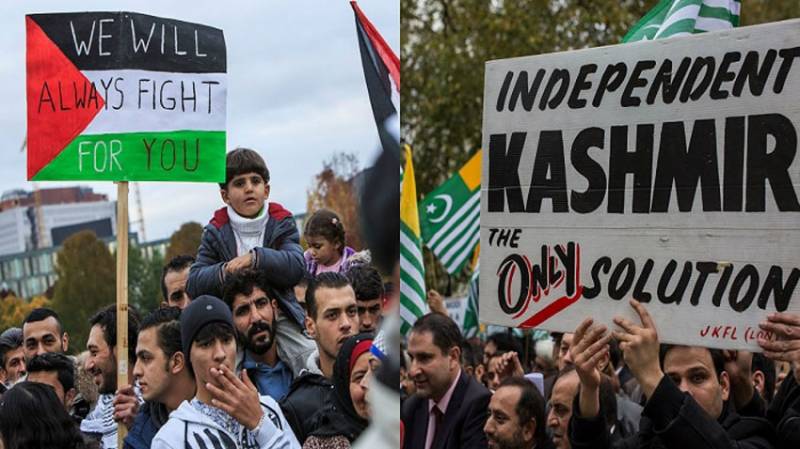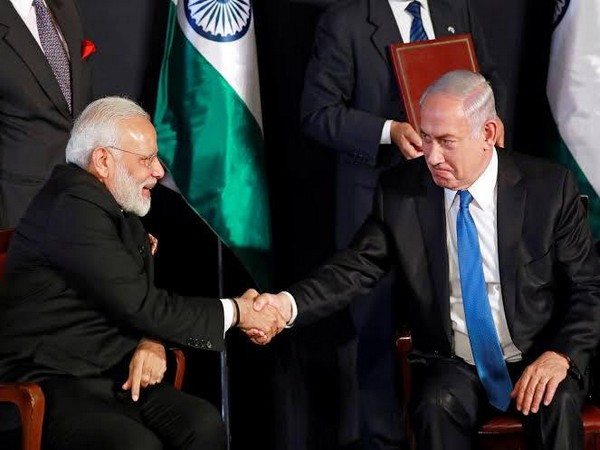India-Israel strategic relations and their expanding areas of mutual cooperation in diverse fields have become an undeniable reality of contemporary world politics. The governments of these two states are determined in enhancing bilateral collaborating venues which will not only be helpful in securing of their strategic regional dominating ambitions but it will further help them in fighting common enemies. The Hindu leadership from India and Jewish authorities of Israel are mainly dedicated to fighting with neighbouring states generally and Muslim nations particularly. The common strategic objective of dominating the regional politics of Middle East and South Asia by standing against the territorially adjoining nations has become the main concern of both India and Israel. sided State officials of the two sides have preferred to adopt an assertive doctrine of belligerent policies for maintaining foreign relations exclusively with neighbouring nations. An anti-neighbourhood policy of both states has resulted in an unending wave of violence in their respective regions. In order to uphold each other in their respective regions, leading state officials from both sides are exclusively emphasizing on mutual cooperation in the fields of defence and security.
The signing of various weapon deals between Israel and India has driven both closer to each other. Israeli technologically advanced and scientifically developed military industrial complex has made New Delhi Israel’s biggest arms importer. New Delhi’s swelling strategic relations with developed states has ranked India among the world’s biggest arms importers in the last five years, and Israel has a significant share in Indian weapon trade. Israel has become India’s third largest weapon supplier after Russia and United States. On the basis of massive foreign supplies of weapons and maintaining close ties with states having highly developed weapon industry, New Delhi shares 13% of the global arms trade. These gigantic weapon purchase helps the Jewish leaders of Israel to expand economic growth of their country. Moreover, several commonalities in their strategic thinking has not only made New Delhi a wealthy customer, it has also increased Indian dependency on Israeli weaponry.
The multiple areas of cooperation between both states go beyond security and defence. Two-sided supportive foundations has extended to intelligence sharing networking. Leading strategic planners of both states are determined to enhance intelligence sharing collaboration between their respective intelligence agencies. The Research and Analysis Wing (RAW) of India and Mossad of Israel are committed to maintain their influential position in the world politics similar to Central Intelligence Agency (CIA), Military Intelligence, Section 6 (MI6), and Main Intelligence Agency (GRU). The main security architectures of India and Israel are focusing on improvement of their foreign intelligence agencies which will enable them to establish their hegemonic positions in Middle East and South Asia. Their common anti-neighbourhood policy compel them further to cultivate friendly ties with the world beyond neighbours. In this way, Hindu and Jewish leaders are less reluctant in carrying the offensive policies in their respective regions parallel to portraying them the only victim of violence of neighbouring states.
The regional positions coupled with similar strategic aspirations of securing a hegemonic position in regional politics and fighting with common rival Muslim governments propelled RAW and Mossad to work together. Their mainstream leaderships are agreed to working closer for achievement of common goals. Extensive cooperation between both intelligence agencies started after the creation of RAW in 1968. New Delhi’s hawkish behaviour against neighbouring states during the 1960s resulted in two wars with Beijing and Islamabad. India’s unforgettable defeat against China in 1962 and against Pakistan in 1965 exerted pressure on Hindu leadership and eventually Indira Gandhi decided to establish an external intelligence agency in 1968. Rameshwarnath Rao (R N Rao), the first director of RAW decided to maintain RAW’s cooperative connections with other intelligence agencies. In order to create a broader network of RAW’s clandestine activities against neighbouring states generally, and Pakistan particularly, New Delhi’s leading spymaster Rao under Gandhi’s administration laid the foundation of RAW-Mossad collaboration. Indira Gandhi’s regime was highly motivated for accomplishment of India’s foreign strategic interests by neutralizing the role of New Delhi’s counterbalancing forces in regional politics of South Asia. In this way, Mossad became the most appropriate intelligence agency for accumulating Indian potential against Pakistan.

The intelligence failures of 1962 and 1965 wars forced the Indira government to establish another intelligence agency separate from Intelligence Bureau (IB). Prime Minister Indira Gandhi realized the demand of more intelligence-gathering against Pakistan and emerging Sino-Pak relations. Indian government defeated by both nations preferred to develop an exclusive intelligence wing for the monitoring of its territorially adjoined nations. R N Rao initially prepared the blueprint of RAW and later became its first director. Rao further continued the progress of RAW and efficiently scripted the first RAW-Mossad alliance. New Delhi believed that the mutual basis of cooperation between two intelligence communities are essential to monitor the potential state which are direct threat to both India and Israel. In this way, Pakistan became a direct target of RAW-Mossad alliance. Pakistan, a potential state standing against India in South Asia and a state that refuses to acknowledge the existence of a Jewish state in the Middle East became a direct target of RAW-Mossad collaboration. Indira’s cultivation of friendly reciprocal ties with Mossad was a critical move which brought another catastrophe in the South Asian subcontinent in 1971 when RAW was actively involved in the eastern part of Pakistan and started massive support to the separatists.
The decade of 1970 dramatically altered the strategic environment of South Asia and Middle East. In South Asia, the crisis between East and West Pakistan was considered to be an appropriate opportunity for the Indira Gandhi government and she let the Indian intelligence services to meddle covertly in Pakistan’s internal affairs. Moreover, the Indian Peaceful Nuclear Explosion (PNE) in 1974 placed Indira Gandhi under international criticism. Simultaneously, Israel was attacked by a coalition of neighbouring Arab forces in 1973. It was Yom Kippur war which threatened Golda Meir’s regime and forced Tel Aviv to consider nuclear option in order to avert the fear of defeat. In this way, Israeli secret nuclear weapon status was partially revealed internationally. The aftermaths of Yom Kippur war resulted in another austere move by Arab nations by putting oil embargo on states supporting Israel during the 1973 Arab-Israel war. So, the positions of both India and Israel in their respective region were less friendly towards other regional states. The fourth prime minister of Israel, Golda Meir, realized the need to develop defence and security relations with the states around the globe where India was considered to be an apposite country. In this way, the intelligence sharing relations between two states dramatically increased during the crisis of 1970s.
Tel Aviv welcomed RAW’s intelligence cooperation because the Jewish authorities always tried to gain an influential position in the Middle East while securing the support of extra-regional states. The policy of creating alliances with foreign nations to neutralize Israel’s opposition in the international system was initially coined by its first Prime Minister David Ben-Gurion. The founding father of Israel, Ben-Gurion, convinced the Knesset for the establishment of a national intelligence agency in 1949 immediately after the creation of Israel. Mossad was fundamentally designed to launch clandestine operations and information gathering networks around the globe. This intelligence agency was created to actively work parallel with other Jewish intelligence wings such as Aman and Shin Bet. Aman is the military intelligence branch of the Israeli Defence Forces (IDF), and Shin Bet is dealing the matters of internal security. Besides Aman and Shit Bet, Mossad was assigned the task of undertaking secret procedures principally relevant to the issues of national security. Its first director, Reuven Shiloah was a close friend and a special aide of Ben-Gurion. Shiloah and Ben-Gurion mutually shared the functions of Mossad and established its clandestine connections across the globe which later resulted in RAW-Mossad collaboration.

While located in different regions, the strategic ambition of both states are designed to develop an anti-Pakistani force. Pakistan is the only nuclear power of the Muslim world and its raising its voice on human rights violations in Kashmir and Palestine has resulted in it becoming a common enemy of India and Israel. Pakistan’s support to the Muslim world and its greater support to the Palestinian land is a real point of worry for Israel. Additionally, Islamabad’s expanding foreign relations with neighbouring states has resulted in a multidimensional diplomatic ties with Beijing which is not acceptable for New Delhi. In this way, the Republic of India and the State of Israel are agreed to create an effective alliance against Pakistan.
In order to offset the emerging alliance of RAW and Mossad, Islamabad needs to seriously redefine its position in world politics. Both India and Israel are active partners of United States and the strong strategic bounds between Tel Aviv and Washington parallel to New Delhi and Washington are the actual points of worry for Islamabad. Moreover, the Jewish and Hindu diaspora in America is another worrisome factor which is cultivating Washington’s support in the Middle Eastern and South Asian politics for Israel and India. The mainstream leadership from Islamabad needs to seriously comprehend the triangular relations of United States-Israel-India. Timely actions by taking adequate step can secure the future of Pakistan. An alliance with likeminded nations along with extension of foreign relations with the western world parallel to strengthening of its balanced role in the Muslim world can further help Pakistan in countering the emerging threat of intelligence-sharing partnership between Israel and India.




